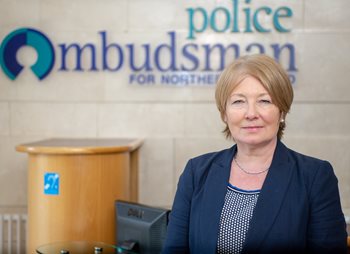The new Police Ombudsman for Northern Ireland, Marie Anderson, has said she will seek to both build on the independence of the organisation and satisfy herself that the investigation of complaints against the police meet modern Ombudsman standards
 .
.
Marie Anderson
Mrs Anderson was speaking as she takes up her role as the head of the police complaints body in Northern Ireland, the fourth person to hold the post.
Mrs Anderson already has considerable experience in Ombudsman roles: she has been the Northern Ireland Ombudsman, investigating complaints about public services, local government standards and judicial appointments, since 2016. Previously she was Deputy Ombudsman for seven years. Mrs Anderson was previously the Assistant Information Commissioner for Northern Ireland for five years and established the Information Commissioner’s office here.
The new Police Ombudsman paid tribute to her predecessor Dr Michael Maguire, for what she called his robust independence and tenacity.
“I believe the Police Ombudsman’s Office got it right from day one when it give as its commitment ‘independent, impartial investigation.’ It was right then and it is right now.
Some of the most significant issues in recent times in Northern Ireland have been about the performance of our public services and officials. People demand accountability from those who serve us.
In my experience, when any process for investigating complaints cannot evidence the independence and impartiality of its findings, the public will lose confidence in it,” she said.
The Police Ombudsman’s Office deals with more than 2600 complaints about the conduct of serving police officers annually. It also has more than 400 complaints about matters related to events during The Troubles.
The Office has an annual budget in excess of £9 million and employs around 150 people.
Mrs Anderson, who is a solicitor by profession, has said that her priorities in the first few months will be to get acquainted with the staff and working practices of the Office:
“I will be looking at the Office’s complaints and investigation procedures to ensure they are fair and underpin its independence.
This will include meeting complainants to the Office and police officers as well members of the Policing Board and the Policing and Community Safety Partnerships.
“I want to satisfy myself that the processes for investigating complaints about police are as simple and accessible as they can be for the user and ensure transparency and learning for the PSNI.
"All public bodies should be open to learning and improvement. The Police Ombudsman’s Office is no different,” she said.